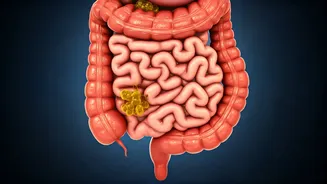Mindful Eating Practices
The first step focuses on mindful eating. This doesn't involve complex dietary restrictions, but rather a change in how you approach your meals. One should
focus on chewing food thoroughly. This practice aids digestion by breaking down food particles, making it easier for your gut to absorb nutrients. Furthermore, eating slowly allows you to recognize fullness cues, preventing overeating, which can strain the digestive system. Making mealtimes a screen-free zone is also suggested, allowing you to focus solely on the food and the experience of eating, which helps you be more aware of your body's signals.
Hydration is Key
Adequate hydration is a foundational element for optimal gut health. Drinking enough water throughout the day is crucial because it helps in the efficient movement of food through your digestive tract, preventing constipation and ensuring smooth bowel movements. It is generally recommended to drink water before, during, and after meals. Aim to sip water consistently throughout the day, rather than guzzling large amounts at once. This supports the digestive process and promotes overall well-being. Proper hydration helps maintain the balance of gut bacteria, supporting a thriving and healthy gut environment.
Probiotic Rich Foods
Incorporating probiotic-rich foods into your diet is essential for boosting gut health. Probiotics are beneficial bacteria that support a balanced gut microbiome, which is vital for efficient digestion and immune function. Include fermented foods like yogurt with live cultures, kefir, kimchi, and sauerkraut in your regular diet. These foods are naturally rich in probiotics. Start slowly if you are not used to them. It helps to increase the amount gradually to allow your gut to adapt. Be sure to check labels to ensure the foods contain live and active cultures. Probiotic supplements can also be considered after consulting a doctor.
Prebiotic Power Foods
Prebiotics act as food for probiotics, supporting their growth and activity within the gut. Prebiotic-rich foods fuel the good bacteria, creating a favorable environment in the gut. Add foods such as garlic, onions, bananas, oats, and apples to your diet to increase your prebiotic intake. Consuming a variety of prebiotic foods can create a diverse gut environment, promoting a healthier balance of bacteria. Prebiotics support the production of short-chain fatty acids, which play a crucial role in maintaining gut health and reducing inflammation. Regular consumption of prebiotics can lead to a more resilient gut.
Manage Stress Levels
Stress can significantly affect your gut health, often causing digestive issues. High stress levels can disrupt the balance of gut bacteria and negatively impact the digestive process. Introduce stress-reduction techniques such as deep breathing exercises, meditation, and yoga into your routine to combat stress. Practicing mindfulness can help to reduce anxiety and promote relaxation. Regular exercise is also an effective way to manage stress. Engaging in these activities can calm your nervous system, allowing your gut to function optimally. Prioritize self-care activities and set boundaries to reduce stressors in your life.
Sufficient Sleep Quality
Getting adequate sleep is vital for overall health and plays a key role in maintaining a healthy gut. Sleep deprivation can disrupt the balance of gut bacteria and increase inflammation in the body, leading to digestive issues. Aim for 7-9 hours of quality sleep each night to help your body recover and function properly. Establish a regular sleep schedule by going to bed and waking up at the same time every day, even on weekends. Create a relaxing bedtime routine that includes activities like reading or taking a warm bath. Improving your sleep habits can significantly improve your digestive health.
Limit Processed Foods
Reducing the consumption of processed foods is crucial for maintaining a healthy gut environment. Many processed foods contain high levels of sugar, unhealthy fats, and additives that can disrupt the balance of gut bacteria and lead to inflammation. Focus on consuming whole, unprocessed foods like fruits, vegetables, lean proteins, and whole grains. Read food labels carefully and be aware of added sugars, artificial ingredients, and excessive sodium. Cooking at home more often gives you better control over the ingredients used in your meals. By limiting processed foods, you can create a healthier environment in your gut and promote better digestion.
Regular Physical Activity
Regular physical activity is not just beneficial for physical health, but also plays a key role in supporting a healthy gut. Exercise aids in promoting regular bowel movements, preventing constipation, and supporting a diverse gut microbiome. Aim for at least 30 minutes of moderate-intensity exercise most days of the week. Activities like brisk walking, cycling, or swimming are excellent choices. Exercise helps to reduce stress, another factor that can negatively impact gut health. It also improves overall circulation, supporting the digestive system. Consistent physical activity enhances gut health and contributes to overall well-being.
Limit Alcohol Consumption
Excessive alcohol consumption can have a harmful effect on your gut health. Alcohol can damage the gut lining, disrupt the balance of gut bacteria, and increase inflammation. If you choose to drink alcohol, do so in moderation. This means limiting your intake to one drink per day for women and up to two drinks per day for men. Opt for drinks with lower alcohol content and avoid binge drinking. Ensure you drink plenty of water while consuming alcohol to stay hydrated. Being mindful of your alcohol intake supports the health of your gut and overall well-being.
Consult a Professional
If you are consistently experiencing digestive issues, it’s important to seek advice from a healthcare professional. A gastroenterologist can provide personalized guidance and help identify any underlying issues. Describe your symptoms in detail and be prepared to discuss your dietary habits and lifestyle. They can recommend appropriate tests or treatments to address your specific needs. They can also provide a detailed, gut-care planner to optimize your daily routine. Early intervention can prevent serious health complications. Regular check-ups and professional guidance can help you maintain a healthy gut and manage any digestive problems effectively.













